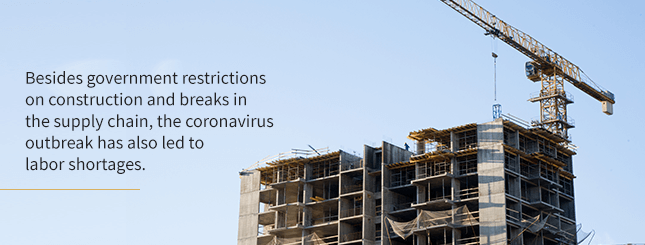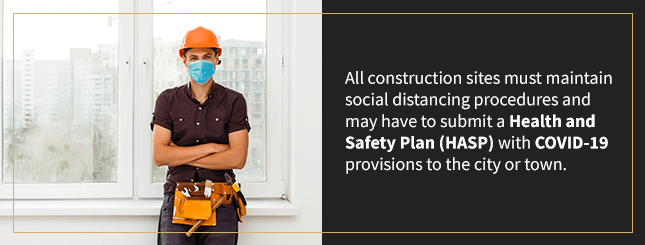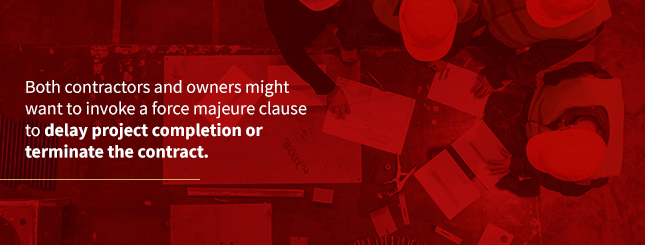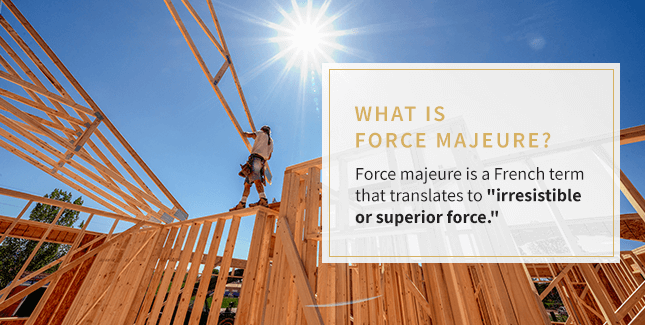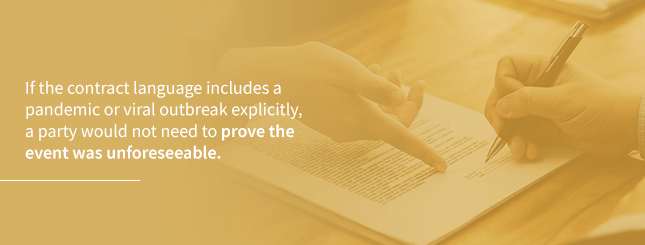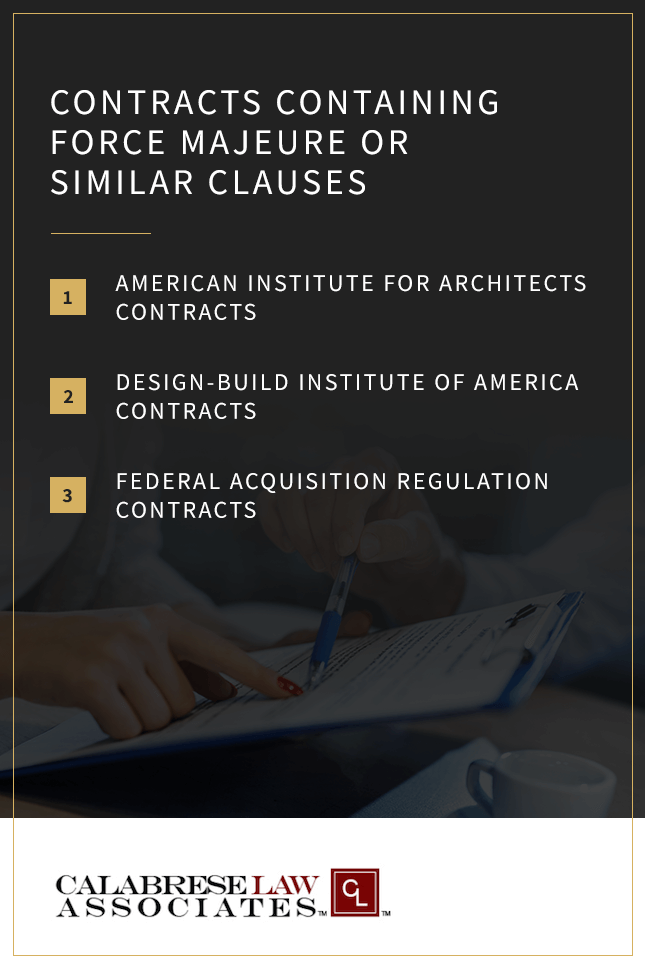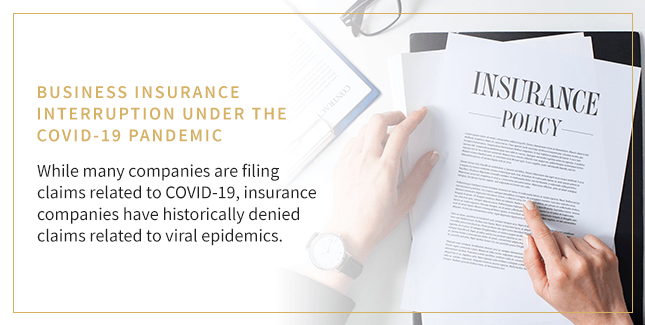The novel coronavirus outbreak has caused a ripple effect of ramifications for businesses across the country. The World Health Organization characterized COVID-19 as a global pandemic on March 11, 2020. Heavily-effected companies in the travel, hospitality, and restaurant sectors have seen huge losses of revenue. However, the construction industry has also seen a unique web of concerns, including delays and loss of business.
We’ve seen an increase in questions and concerns regarding construction law under coronavirus. While differing definitions of essential work has led some states to put a halt to all or most construction, it has also disrupted the supply chain. Factories and suppliers canceling their operations has caused even essential projects to have delays. In many cases, this calls for contractors to request an adjustment of time allotment or to terminate the contract. Owners, concerned about a loss of revenue, may also seek to exit an agreement.
How Is COVID-19 Impacting the Construction Industry?
Throughout the country, the global pandemic caused by the coronavirus has lead to an economic downturn and disruptions for most businesses. While many companies have transitioned to remote work temporarily, this is not possible for the construction industry. Many states have issued bans or limitations on construction, which has brought many projects to a standstill.
The State of Pennsylvania, for example, has put a halt to all nonessential operations, including construction. While most states deem construction an essential service, differences across state lines can still impact the construction industry. In Pennsylvania, much of construction-related manufacturing plants, such as gypsum, glass, and industrial machinery, have also ceased production. Shuttered factories around the country are disrupting the construction supply chain.
Furthermore, international construction supply chains are also affected. With 30% of all U.S. building supply imports coming from China, sidelined manufacturing in China and the rest of the world is also taking its toll here. Besides government restrictions on construction and breaks in the supply chain, the coronavirus outbreak has also led to labor shortages.
With the virus spreading quickly, companies can expect to see more workers calling out sick. Other employees might choose to stay home out of concern for their safety. So far, two construction unions have walked out on Massachusetts jobs. Both the Painters and Allied Trades Union and the North Atlantic States Regional Council of Carpenters have asked members to refrain from work until it is safe to return.
What Are The Legal Constraints and Frustrations?
Contract law under coronavirus sees some unique challenges. In some cases, government decrees may halt construction work. In other cases, health and safety issues or disruptions in supply chains can cause delays. A contractor or its employees may wish to not work during the viral pandemic out of caution. An owner may want to terminate a contract due to a loss of income. Many COVID-19-related contract disputes are cropping up as a result.
Construction Bans and Other Legal Limitations
In Massachusetts, construction is deemed essential. The Massachusetts Commonwealth has issued a series of COVID-19 construction safety procedures. All construction sites must maintain social distancing procedures and may have to submit a Health and Safety Plan (HASP) with COVID-19 provisions to the city or town. When safety guidance cannot be followed, the site must be secured, and construction paused until the State of Emergency has ended. The Massachusetts Building Trades Council has urged Gov. Charlie Baker to shut down all projects in the state.
Furthermore, in Boston, Mayor Walsh issued an order to stop all construction projects. The move sidelined billions of dollars worth of projects and idled thousands of workers. So, according to Massachusetts law in the Greater Boston Area, it is illegal to perform construction if:
- The job site is within the bounds of the city of Boston.
- It’s not possible to adhere to social distancing or to provide adequate PPE to employees and follow safety requirements.
- The construction project Owner’s COVID-19 Officer, or a state or local inspector, finds the site to violate social distancing and safety requirements.
- The city or town government has not approved the COVID-19 safety plan within the HASP.
Common Construction Contract Issues and Frustrations
Construction bans and unforeseen supply and labor shortages have caused an increase in contract disputes regarding projects in progress and contracts about to go into effect. These issues have affected contractors, subcontractors, and owners — some examples include:
- Notices claiming extensions of time due to COVID-19-related delays — generally framed as a force majeure claim.
- Notices declaring both cost consequences and extensions of time, which usually invoke a change in law, government risk, or a political force majeure.
- New contract language to include or exclude COVID-19 from deals where part of the deal closed before the novel coronavirus outbreak and another part has not yet closed.
- Review of contract termination rights related to COVID-19.
What Is Force Majeure and the Impact From Coronavirus?
With so many causes for delay in construction projects, many contractors and Massachusetts property owners are exploring their rights related to force majeure and frustration of contract claims. For construction companies, issues with suppliers, labor shortages, and state laws might make a project impractical or even impossible to complete within the deadline laid out in the contract.
A project owner might wish to terminate a contract in the current situation. Social distancing guidelines and bans on gatherings and nonessential businesses can make some construction projects impractical. For example, an owner might want to delay or cancel construction of an event venue, since such a company could not legally operate during the COVID-19 pandemic.
Both contractors and property owners might want to invoke a force majeure clause to delay project completion or terminate the contract.
What Is Force Majeure?
Force majeure is a French term that translates to “irresistible or superior force.” In U.S. common and civil law, the term is used in contracts to cover natural and unavoidable disasters that impact contract performance. When a force majeure clause is included in a contract, it can excuse nonperformance when the circumstances prevent a party from fulfilling the obligations.
Most standard construction contract language does not use the term force majeure. The term is not typically used by standard American Institute for Architects (AIA), ConsensusDocs, or federal government construction contracts. Instead, remedial clauses address delays and time extensions.
The bar to establish force majeure is high. For example, an event that makes work merely inconvenient or more impractical to complete does not automatically constitute force majeure. When considering whether force majeure applies to a particular contractual relationship, courts look at three factors:
- If the contract language allows for the COVID-19 pandemic to be interpreted as a force majeure.
- If the risk of the incident causing nonperformance was anticipated and able to be mitigated.
- If performance was impossible.
So, while the first step is to determine if the contract language considers a pandemic a force majeure, a party must also prove that the risk was unforeseeable and unable to be helped and that fulfilling the contract is truly impossible.
Invoking Force Majeure Under Coronavirus
Many are seeking to make a force majeure claim in the wake of COVID-19, and contract law allows for a few circumstances which give such claims merit. If the language of the contract includes “pandemic,” then the WHO’s declaration of a “pandemic” could trigger a force majeure clause. A mention of “epidemic” or “viral outbreak” would also be included.
If the contract language includes a pandemic or viral outbreak explicitly, a party would not need to prove the event was unforeseeable. To invoke force majeure under COVID-19, the party would still need to establish they took steps to alleviate the damage and that fulfilling the contract was sincerely impossible.
For a contract that doesn’t expressly include pandemics, governmental restrictions on travel, gatherings, and nonessential business can make it possible to invoke a force majeure clause. A more generalized reference in a force majeure clause, such as a “natural disaster,” an “act of God,” or something “beyond the contractor’s control,” might be interpreted to include coronavirus disruptions. Some states understand acts of God to include natural disasters as well as wars, riots, and epidemics, while other states limit the interpretation to natural occurrences.
Massachusetts defines an “act of God” explicitly to be an unforeseeable natural disaster or natural phenomenon — unexpected given the area, season, and history. It’s also important to consider how the law controlling your contract defines a force majeure. Differences in law might reinforce or limit how your contract’s clause can be applied.
Contracts Containing Force Majeure or Similar Clauses
Construction of terms under contract law can determine whether a party is allowed to invoke force majeure due to COVID-19. Here’s how some standard construction contracts define force majeure clauses and apply termination rights to each party:
American Institute for Architects Contracts
Standard AIA A201-2017 General Conditions include provisions in Delays and Extensions of Time, Section 8.3.1. The language allows for an extension of Contract Time “for such reasonable time as the Architect may determine.” Events covered in this section include “labor disputes, […] unusual delay in deliveries, unavoidable casualties, […] or other causes beyond the Contractor’s control.”
Both the contractor and the owner may also have the right to terminate or suspend the contract. In the section, Termination or Suspension of the Contract, Article 14.1.1 allows the contractor to terminate the agreement if work has stopped for “30 consecutive days through no act or fault of the Contractor.” The language makes provisions for an act of government and expresses the declaration of a national emergency, which causes work to be stopped.
The owner may also suspend or terminate the contract for convenience, as laid out in Article 14.3. In such a case, adjustments for increases in cost and time shall be made.
Design-Build Institute of America Contracts
The Standard Form of General Conditions of Contract Between Owner and Design-Builder specifically defines a force majeure event. Section 1.2.8 includes “epidemics” and “other acts of God” within its definition of force majeure events. Section 8.2, “Delays to the Work,” delineates the contract time will be reasonably extended for force majeure events. It does not entitle the design-builder to an adjustment of price for force majeure events.
According to section 11.1, the owner has the right to stop work for a period of up to 60 consecutive days or an aggregate of 90 days for convenience. The design-builder is then entitled to an adjustment of the contract price and time. Section 11.4 lays out the design-builder’s right to terminate the contract. If the work has stopped for more than 60 consecutive days or more than 90 aggregate days during the project — because of “any government authority having jurisdiction over the work” — the design-builder may terminate the contract.
Federal Acquisition Regulation Contracts
For a project under federal contract, FAR 52.249, “Excusable Delays,” lists events worthy of an excusable delay. These events include “epidemics,” “quarantine restrictions,” and “strikes.” This clause should provide the contractor with a time extension. Check to see if FAR 52.249 is included in your contract, as some federal contracts may exclude this section. It’s crucial to make careful documentation of all delays and any facts related to the case.
How to Proceed When a Contract Contains a Force Majeure Clause
It’s critical to note that the specifics of your contract agreement determine if your party has the right to invoke a force majeure clause. Further, it is wise to pursue an out-of-court agreement first. If parties can come to a satisfactory arrangement without taking legal action, it can preserve the relationship for future projects. Commercial considerations might take precedence. If parties have a shared objective of resuming performance once it is safe to do so, and no party is at fault, cooperation and mutual understanding are vital.
If you wish to pursue a mutual agreement or to invoke a force majeure clause, contact the contract law attorneys at Calabrese Law Associates for a free consultation. Experienced in construction and contract law, we have represented construction companies, contractors, subcontractors, developers, architects, owners, and others involved in construction-related legal issues. When a contract dispute occurs, our law firm can help you resolve a matter through negotiation or litigation, if needed.
If you intend to invoke a force majeure clause, pay careful attention to requirements for giving notice. Many contracts include a time limit for invoking a force majeure clause and advanced warning to other parties. If your agreement has no expressed limitations on giving notice, timely communication is best practice. It maintains good relationships and keeps every party informed on the matter. Contractors and property owners should attempt to cite contract terms and laws without limiting themselves to one clause and potentially losing out on relief afforded by other provisions.
Most force majeure clauses allow for an extension of time and typically don’t include a change in price. Costs of performance may increase due to COVID-19-related shortages. Other terms of the contract may allow for increased compensation.
Contracts Lacking Force Majeure Clauses
As the coronavirus outbreak worsens throughout the United States, many contractors are discovering their agreements have no guidance on excusable nonperformance. Courts will probably reject a force majeure claim if there is no express language in the contract. Even without a force majeure or remedial clause, contractors may be able to find relief. Some common law mechanisms are a possible avenue. The common law defenses of impossibility or commercial impracticality are angles to consider. These doctrines can be invoked if the circumstances meet three conditions:
- An unanticipated event occurred, which intervened on contract performance.
- The contract assumed such an event would not occur.
- The incident made contractual performance impossible or impractical.
These doctrines rely on “basic assumptions” to determine if the agreement presumed a specific event would not occur. For example, one underlying assumption is that the construction project within the contract will not be destroyed. However, events such as shifts in the market or financial inability to perform do not constitute unforeseen events as a “basic assumption” of the agreement. Courts may liberalize these doctrines in light of the coronavirus pandemic, though they have not yet addressed the issue.
Another alternative can be to invoke the common law defense of frustration of purpose. Frustration of purpose occurs when an event invalidates the goal of the agreement. To invoke the frustration of purpose doctrine, the circumstances of the unforeseeable event must be significantly different, such that a party would not be able to fulfill the original purpose of the agreement. It’s not enough to claim that the transaction would not be profitable.
Before invoking any common law doctrines, it is essential to look at the circumstances of your agreement. Courts in different states interpret common law differently. For example, not all states recognize impracticality as a defense — only impossibility. You must always take steps to mitigate any delays and continue to fulfill contractual obligations. Contact Calabrese Law Associates for a free consultation to determine which common laws may apply to your case.
Business Interruption and Business Insurance Interruption Under the COVID-19 Pandemic
Outside of contract disputes, some in the construction industry are seeking help from business insurance interruption policies. Business interruption insurance helps a company cover losses resulting from disruptions to business operations. These policies often cover lost revenue, expenses such as rent and utilities, or costs related to operating from a temporary location. Contingent business interruption insurance covers damages and lost profits from interruptions in the supply chain.
While many companies are filing claims related to COVID-19, insurance companies have historically denied claims related to viral epidemics. After the SARS outbreak in 2002 and 2003, many insurance companies saw huge payouts from business interruption claims. Afterward, companies excluded viral and bacterial diseases in their policies. If you are considering making a business interruption claim, read your insurance policy carefully. You may find direct language explicitly excluding pandemic, epidemic, and outbreak coverage.
Government Intervention on Coronavirus-Related Business Interruption Insurance Claims
For Massachusetts-based companies, Bill S.D.288, introduced on March 24, 2020, may provide relief. The bill proposes that no insurer in the commonwealth may deny a claim related to loss of use and occupancy or for business interruption because of COVID-19. If passed, this bill would require insurance companies to cover claims, even if their policy excludes losses resulting from infections.
The bill would only require insurance companies to cover insured customers who have 150 or fewer full-time employees within the commonwealth. It would only cover business interruption or loss of business claims which occur before the state of emergency, declared by Gov. Charlie Baker on March 10, 2020, is lifted.
In the U.S. Congress, a bipartisan group of House members wrote to four insurance industry trade groups, asking them to add Business Insurance coverage to their policies for small businesses retroactively. The insurance group representatives responded, saying plans are not designed to provide coverage for infectious diseases. These groups proposed an option where small businesses can submit claims to insurance companies as if coronavirus-related losses are covered. The insurance company would then determine an appropriate payout, which would be funded by the government.
Until any law or agreement goes into effect, your company is bound by the language governing viral outbreak coverage in your business insurance policy.
Ask for a Free Consultation From Calabrese Law Associates
Contract law and related claims involving Massachusetts construction are becoming increasingly complicated in the wake of coronavirus; things are even more complex in the densely populated City of Boston when also applying Boston City Ordinances. If you’re considering invoking a force majeure clause, terminating a contract, or filing a business insurance claim in connection with COVID-19 in the Boston area, an adept legal team can help you find the relief to which you are entitled. As construction attorneys experienced in contract law, Calabrese Law Associates understands the unique challenges of your industry.
Contact Calabrese Law Associates in Boston and Burlington for a free consultation. Let us guide you through the complexities of Massachusetts construction law under COVID-19. We can review your contract, your claim, and the circumstances of your situation to determine if you have a strong case. Having representation that’s experienced in construction law can be a valuable asset at the negotiation table or in court, especially during the current coronavirus pandemic.
*This publication and its contents are not to be construed as legal advice nor a recommendation to you as to how to proceed. Please consult with a local licensed attorney directly before taking any action that could have legal consequences. This publication and its content do not create an attorney-client relationship and are being provided for general informational purposes only.
*Attorney Advertising. Prior results do not guarantee a similar outcome.




